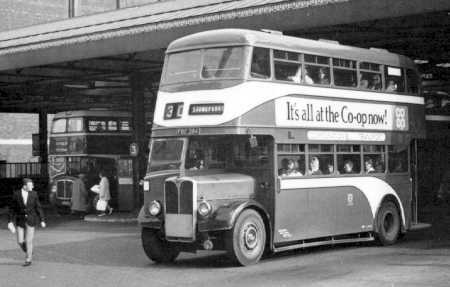Kingston upon Hull Corporation Transport
1949
AEC Regent III 9612E
Weymann H30/26R
As part of the replacement programme for the post-war AEC Regents, by Leyland Atlanteans, a number of second-hand vehicles were purchased by Hull Corporation. As mentioned in a previous Hull Corporation posting one of these batches were twelve AEC Regents from Leicester Corporation, which were purchased in 1966. They were allocated fleet numbers 201 to 212, but this was amended in October, 1966 to 101 to 112. Nine of the vehicles which were then in service had their fleet numbers altered, but 109, 110 and 112, entered service carrying the new numbers. Registration marks were FBC 282 to 288, 291 to 295. They were withdrawn between November 1968 and December 1969. The photo shows 103 (FBC 284) leaving the Coach Station on service 30 to Stoneferry.
Photograph and Copy contributed by Keith Easton
A full list of Regent III codes can be seen here.
29/04/12 – 17:06
The streamlined livery on this strangely old-fashioned body style gives this bus a very 1930s feel.
Paul Haywood
30/04/12 – 07:42
The bodies were actually MCW, not Weymann, based on a design going back to 1933! Obviously upgraded and updated, but nevertheless to the old basic shape. Very attractive too, but I think they looked even more wonderful in Leicester’s glorious maroon and cream. LCT had another batch of Mark IIIs, with Brush metal bodies, and these too were very attractive vehicles, the post war Brush metal framed bodies being most unlike the composite style.
Leicester was a most interesting fleet, right from the early days, and one which I plan to study in a bit more detail as I have lived near Leicester now for over 40 years.
Anyone fancy joining in?
John Whitaker
30/04/12 – 09:07
Talk about unobservant, I’d not even looked at the “title” paragraph. Just to be really awkward, John, they are MCCW (Metropolitan Cammell Coach Works). MCW (Metropolitan Cammell – Weymann) was a marketing company until the two firms merged in 1965/6 to form a new MCW manufacturing company.
David Oldfield
01/05/12 – 07:03
I thought MCCW stood for Metropolitan Cammell Carriage and Wagon (Co Ltd). That’s what it said on Manchester Corp’s body plates.
I think that more than anything else it’s the sharply raked-back of the front, and consequent small first upper deck window, that makes this design look so archaic.
Peter Williamson
01/05/12 – 07:04
Hi David – Sorry MCCW stood for Metropolitan Cammell Carriage and Wagon, a builder solely of railway rolling stock until a diversification into steel framed bus bodies circa 1930. Bodies of the same basic design as FBC 284 were also supplied to Nottingham, Salford, Wallasey and Glasgow (Glasgow’s were built by both MCCW and Weymann’s).
Michael Elliott
01/05/12 – 19:38
Peter and Michael, I knew that and was just waiting for someone to correct me. It was a moment of unforgivable senior madness. Forgive my lapse of standards. [see other post!!!]
David Oldfield
16/07/12 – 06:23
I remember both these and the Brush bodied ones in service in Leicester. Powerful engines and pre-select gearboxes gave a very smooth ride – far more refined than the All-Leyland PD2s, in my opinion.
Adrian Griffiths
13/07/18 – 07:35
Does anyone know if Hull CT reregistered these purchases with local registration numbers. Reason for asking is that there has recently been posted on the Old Hull facebook page a picture of a bus not in any of the Hull operators livery but bearing a local reg No GKH 384.
Reg Oakley
14/07/18 – 06:57
The bus in the photograph Reg Oakley refers to is a Leyland TD series, and its registration matches its age, falling in the gap between a batch of Hull AEC Regents and a pair of East Yorkshire Leyland TD7s. Therefore it isn’t a re-registration. Hopefully someone will recognise it.
Peter Williamson
14/07/18 – 10:56
I’ve created the link below to the facebook page mentioned by Reg Oakley (above) – creating such a link is perfectly within the rules. If you scroll down the comments on the said facebook page you’ll see that the vehicle has been identified as being ex-Hull Corporation, one of four Leyland TD7/Leyland diverted to Hull in 1942, 200-3 (GKH 381-4).
In the facebook pic (reputedly taken in 1960, the year of GKH 384’s withdrawal from the passenger fleet), it looks as though it might have been transferred to an alternative council department.
The Facebook link is www.facebook.com/photo.php?fbid
David Call
16/07/18 – 07:50
Titan no. 203 went to the City Engineer’s Department for staff transport to new estates on the edge of the city and was given an all green livery and lasted until sometime in 1963. Believed scrapped in 1964.
Regents 245 and 250 also went the City Engineer in 1966.
Malcolm J Wells
17/07/18 – 06:31
This bodywork reminds me so much of Provincial of Gosport’s similar-bodied pre-war buses – only the post-war radiator giving the game away as to the Hull version’s relative newness!
Chris Hebbron

Leave a Reply